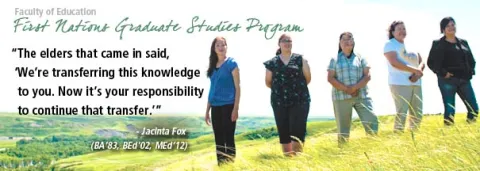Fox Family: Masters of Education
The FNMI Master of Education Curriculum Leadership program was designed to work with the community in developing educational leaders. When the cohort convocated this year, five women from the same family crossed the stage.

L to R: Jessica Fox (BA/BEd’05, MEd’12), Amanda Fox (BSc’02, UBC: BEd’07, UofL: MEd’12), Genevieve Fox (BA/BEd’03, MEd’12), Jacinta Fox (BA’83, BEd’02, MEd’12), and Samantha Creighton (BA/BEd’03, MEd’12)
Two generations of Blackfoot women from one family were among the first to convocate this spring from the First Nations, Métis, Inuit (FNMI) Master of Education Curriculum Leadership Program at the University of Lethbridge. Genevieve Fox, her sister Jacinta, daughters Amanda and Jessica, and niece Samantha all credit their families for instilling in them the importance of education.
“Our parents motivated us,” says Jacinta Fox. “Our brother was one of the first from our reserve to get an education degree.” Five siblings are now university-trained, four as educators.
Their children followed.
“When we finished high school there was never any question we were going on,” says Jessica Fox.
“It was just a matter of when,” adds Samantha Creighton. “The best part of my education was here at the University. It gave me back my identity. Learning more about our culture and history made me proud. Being with family was motivating in itself.”
“I could turn to anybody for help,” says Amanda Fox, “my mom, my sister or one of my profs.”
Learning from Blackfoot elders was invaluable, as was visiting sacred sites throughout southern Alberta: Writing on Stone, Napi’s Playground, Woman’s Buffalo Jump, and others.
“We learned about who we are,” says Amanda.
“Our children came and experienced the sites with us,” says Jessica. “It’s important to pass lessons from family and elders to the next generation.” As part of her master’s degree, Jessica wrote a children’s book about a visit to Blackfoot grandparents. “We don’t have enough Blackfoot literature at any level, but specifically for young children,” says the Saipoyi Community School teacher.
“Students can relate if they see themselves in literature,” agrees Genevieve. Thomas King’s Medicine River is one example. “It’s set in Southern Alberta using characters from the Blood Tribe. Something like that makes students appreciate reading.” Genevieve teaches English and Aboriginal Studies at Red Crow College, while working on translating literary terms into Blackfoot, her first language.
“I took for granted the ability to speak it,” she says. “The FNMI program reinforced that we need to retain it. I’ve come away with a deep appreciation for the language.”
“Keeping the language alive is my passion,” says Jacinta, who coordinates the Kainai Board of Education Head Start program for three-year-olds. “If we don’t do anything, it’s projected that by 2027 only two percent of our population will be fluent.”
Samantha infuses Blackfoot knowledge into high school social studies curriculums. “I want students to know where they come from and who they are,” the Red Crow College instructor states. “As long as they know that, they’re going to succeed.”
Amanda, who teaches at Kainai High School, incorporates Blackfoot learning into science curriculums. “Traditionally we learn through doing,” she says. “We can reach Blackfoot students easier if we teach in traditional ways.”
“All those things we didn’t know, we’ve learned in the FNMI program,” says Jacinta. “The elders that came in said, ‘We’re transferring this knowledge to you. Now it’s your responsibility to continue that transfer.’”
